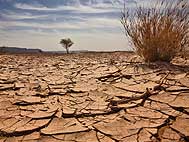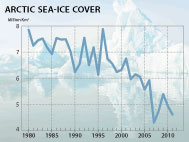| SEARCH |
-

Nov 17, 2015
Reflections on a three-decade legacy
The International Geosphere-Biosphere Programme (IGBP) will come to a close at t...
-
Nov 17, 2015
Use of and access to content on this website
Text and images produced by IGBP in house are free to use with appropriate credi...
-
Nov 12, 2015
Bella Gaia performance and panel discussion to mark IGBP's closure
A musical performance by Bella Gaia will celebrate the achievements and legacy o...
-

Towards Future Earth:
evolution or revolution?
During its three decades of existence, the International Geosphere-Biosphere Pro...
-
A personal note on IGBP and the social sciences
Humans are an integral component of the Earth system as conceptualised by IGBP. João Morais recalls key milestones in IGBP’s engagement with the social sciences and offers some words of advice for Future Earth.
-
IGBP and Earth observation:
a co-evolution
The iconic images of Earth beamed back by the earliest spacecraft helped to galvanise interest in our planet’s environment. The subsequent evolution and development of satellites for Earth observation has been intricately linked with that of IGBP and other global-change research programmes, write Jack Kaye and Cat Downy .
-
Deltas at risk
Around 500 million people worldwide live on deltas, but many of the world's deltas are sinking due ...
-
Climate change: the state of the science
A new data visualization released on the first day of the plenary negotiations at the UNFCCC’s clima...
-
Climate Change:
the State of the Science
Videos now online from the Stockholm public forum to mark the launch of the IPCC's climate report, 2...

Land-Ocean Interactions in the Coastal Zone (LOICZ)
LOICZ SSC Chair Faculty of Science and Technology
University of Algarve, Portugal
Email: anewton@ualg.pt
Case studies
LOICZ has invited coastal scientists from around the world to submit well-documented case studies of such problems and are now analyzing the case studies using a similar methodology. The project has developed a series of simple questions that are based on the DPSIR (driver-pressure-state-impact-response) framework (OECD, 1993)[1]. This framework links economic drivers through to the impacts on the environment, on the ecology, on the economy, on society and health. Societal responses are also being categorized as governance, policy, management, technological and engineering, educational and scientific responses.
Solutions
But LOICZ scientists are interested in solving, not just studying coastal environmental problems. LOICZ is seeking to provide innovative solutions to these common coastal problems rather than yet more studies. One of the major challenges is the different scales of the systems, but also the degree of development. Although several mega-cities are coastal, many of them still lack adequate infrastructure, such as urban waste-water treatment. The intent of LOICZ scientists is to inspire, manage and produce timely syntheses and assessments on key coastal issues and the watershed. We are developing a user-friendly toolbox to help coastal scientists and managers. These include well-established tools such as the biogeochemical budgets as well as new tools such as conceptual diagrams and report cards. LOICZ is at present researching how to link the biogeochemical model with the LOICZ typology and ASSETS, an assessment of estuarine eutrophication methodology.
LOICZ is using cross-cutting workshops to test these tools in the global coastal context and thus achieve regional syntheses. The current theme of the cross-cutting workshops and research is coastal lagoons. LOICZ has carried out a study of Indian lagoons (see the LOICZ newsletter INPRINT 3 (2008). The next study will be of the lagoons of the Middle East and North Africa region, and a workshop will be held in Rabat 11-16 May 2009.
LOICZ scientists are also working with scientists from other projects to bridge and link their initiatives together. For example, LOICZ and IGBP’s Integrated Marine Biogeochemistry and Ecosystem Research (IMBER) project have been working together to develop an implementation strategy for continental margins research.
Climate tourism in coastal zones
LOICZ and the International Human Dimensions Programme (IHDP) have also been investigating water consumption by the tourism sector in Southern Europe. The Mediterranean climate with warm, wet winters and hot, dry summers makes this region an attractive tourist destination for North Europeans and also the site of many second homes. Whole coastal stretches are devoted to the socio-economic activity of tourism, such as the Algarve (Portugal), the Costa del Sol (Spain), the Côte d’Azur (France) and the Amalfi coast (Italy). The peak tourist season during July-September, when excessive water extraction supports the consumption by tourists and their activities (eg. golf courses and swimming pools), also coincides with the driest season of the year. A pilot study of the use of water by tourists was made in the coastal area of the Algarve, Portugal. The results of the study will be used for a larger-scale study of water use by tourism in the Mediterranean region, including seasonal migration, environmental change, water scarcity, governance and human security. The report will be communicated to stakeholders and decision makers such as the regional tourist office, the regional water provider, the regional environment agency and the National Water Institute. LOICZ hopes to replicate this pilot study in the coming years throughout the Mediterranean and in other regions of the world that experience “climate” tourism.
Scientists are increasingly aware that many coastal zones are experiencing regime changes. Management measures are often insufficient to reverse the damage done to coastal ecosystem structure and function. The effect of global change on the coastal zone is difficult to quantify, but in many cases the degradation of coastal systems seems to have passed a threshold. We are walking along a cliff-top in thick fog, not knowing where the edge is. Although we are navigating through a “perfect storm” of economic turbulence, mankind cannot consider environmental issues to be a luxury. Coastal ecosystem goods and services continue to be misunderstood, undervalued and mismanaged, taking us ever further from sustainable use of the very ecosystems that we ultimately depend on.

1. OECD. 1993. OECD Core Set of Indicators for Environmental Performance Reviews. A Synthesis Report by the Group on the State of the Environment. OECD, Paris.

If you wish to participate in the global survey of case studies on coastal zone depredation, please submit your study to Alice Newton, anewton@ualg.pt. You should describe the case study in two to three paragraphs, attach a visual for which you have copyright and answer the questions below:
- What was the main driver of the change?
- Why did things go wrong and how?
- What were the main pressures?
- Were there any indicators of change of state; what were they and why were they ignored?
- Was there any foresight or environmental impact assessment?
- Was this ignored or did no-one think about the consequences and impacts?
- Were ecosystem goods and services ravaged or misunderstood?
- Were the impacts environmental, ecological, economic, social?
- Is it reversible with appropriate response or are we now so far into another “stable” state that we may not be able to go back?
- What can we learn from this?
To participate in the pilot study on coastal tourist areas in the Mediterranean, and other coastal tourist localities, contact Alice Newton at anewton@ualg.pt.
And for more information:
on the biogeochemical budgets, with new tools such as conceptual diagrams and report cards, please contact Dennis Swaney, dps1@cornell.edu. And look up
- ASSETS, the assessment of estuarine eutrophication methodology, see http://www.eutro.org/.
- onceptual diagrams and report cards, see http://ian.umces.edu/
on Lagoons
- Workshop on Indian Lagoons, in the LOICZ newsletter IMPRINT 3 (2008) page 16, http://www.loicz.org/products/publication/newsletter/index.html.en
- Participate in the workshop on Lagoons in the Middle East and North Africa, Rabat 11-16 May 2009, contact Prof. Maria Snoussi, snoussi@fst.ac.ma.
IGBP closed at the end of 2015. This website is no longer updated.
-

Global Change Magazine No. 84
This final issue of the magazine takes stock of IGBP’s scientific and institutional accomplishments as well as its contributions to policy and capacity building. It features interviews of several past...
-

Global Change Magazine No. 83
This issue features a special section on carbon. You can read about peak greenhouse-gas emissions in China, the mitigation of black carbon emissions and the effect of the 2010-2011 La Niña event on gl...
-
INTERGOVERNMENTAL PANEL ON CLIMATE CHANGE:
How green is my future?
UN panel foresees big growth in renewable energy, but policies will dictate just how big.
-
UK:
'The Anthropocene: a new epoch of geological time?'
Royal Society, Philosphical Transactions A




















